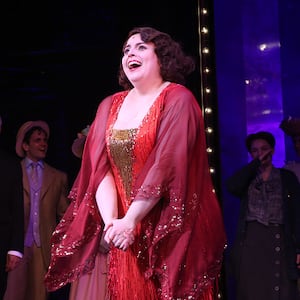It’s crunch time for Lea Michele, who will begin her controversial Funny Girl stint on Broadway right after the long weekend. Though there’s certainly been plenty of drama surrounding former star Beanie Feldstein’s exit in the show, there’s a bigger problem Michele faces as she takes the Broadway stage: her likability.
A handful of folks are clearly devoted to Michele—the skyrocketing ticket prices for Funny Girl beginning Sept. 6 are evidence—but the actress still faces a boatload of allegations against her. In 2020, a handful of her Glee co-stars spoke out against Michele, reporting racist and transphobic behavior on set.
There’s reportedly a much more complex history of Lea Michele traumatizing her co-stars—it’s not all Glee-related—but the key allegation comes from co-star Samantha Ware. In June 2020, after Michele tweeted about Black Lives Matter, Ware responded with, “I believe you told everyone that if you had the opportunity you would ‘shit in my wig!’” Another offense: transphobia towards model Plastic Martyr, who claimed Michele once tried to eject her from the women’s bathroom.
Michele did “apologize” (if you can call it that) for her past behavior back in 2020, but in doing so, she denied any allegations of being racist or transphobic. In a new profile with The New York Times, however, Michele seems to recognize these claims—and excuse herself from them.
While the actress said she “doesn’t feel the need to handle things” through the media, she did open up about why she might’ve been acting the way she did.
“I have an edge to me. I work really hard. I leave no room for mistakes,” she said. “That level of perfectionism, or that pressure of perfectionism, left me with a lot of blind spots.”
Michele continued, “I really understand the importance and value now of being a leader. It means not only going and doing a good job when the camera’s rolling, but also when it’s not. And that wasn’t always the most important thing for me.”
Longtime collaborators Jonathan Groff and Ryan Murphy also shared in the sentiment that Michele has changed her ways, mostly since she got married and had her first child. Groff said that he and Murphy got dinner with Michele right after her wedding, and recalled Murphy saying: “This was the first time I’ve had dinner with Lea where the main topic of the conversation wasn’t about her.”
Fans (and critics) of Michele have coped with her diva-like behavior by turning her into a meme (the joke is that she can’t read). But the actress has had enough of that, too. While she still didn’t technically comment on her ability to read—we’ll have to continue to speculate on that—she did ask people to cool it with the goofs.
“I went to Glee every single day; I knew my lines every single day,” she said. “And then there’s a rumor online that I can’t read or write? It’s sad. It really is. I think often if I were a man, a lot of this wouldn’t be the case.”
Sure.
Really, though, if Michele wants to be seen in a favorable light, she’s going to need to do more than just sing her heart out next week. There’s little-to-no chance that she’s shaking the “can’t read” meme anytime soon, nor the narcissistic persona, nor the racism or transphobia allegations. Michele can certainly act like a delightful Fanny Brice on stage, but she can’t keep brushing her cruel past under the curtain.








